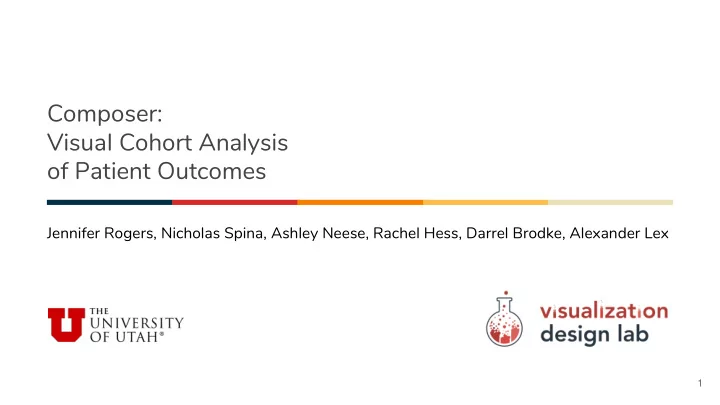

Composer: Visual Cohort Analysis of Patient Outcomes Jennifer Rogers, Nicholas Spina, Ashley Neese, Rachel Hess, Darrel Brodke, Alexander Lex 1
Lower Back Pain is a Significant Health Burden 2.6 Million Emergency Room visits Treatment exceeding $100 Billion 2
This is Frank. He has a herniated disc. 3
Intervertebral herniated disc Dakota Harr lower back pain weakness in legs bladder and bowel problems 4
Three treatment options to consider with his doctor. 5
Surgery mostly effective for persistent symptoms Risk involved, takes time to recover 12% will need another one within 4 years. 43% of these will need fusion 6
Frank has some pre-existing conditions. Age 55 Diabetic BMI: 29 Tried physical therapy 7
Takes these into account along with past experience and clinical guidelines. 8
general population may not provide an accurate reflection of potential outcomes for patients with pre-existing conditions . diabetic BMI: 30 9
EHR for evidence based comparisons Identify factors that can influence recovery and more accurately predict outcomes 10
Dataset of Prior Cases Outcome Accurate Cohort Measures at Many Definition Timepoints Prognosis Under Different Treatment Options 11
Cohorts : subset of the general population shares defining characteristics 12
Effective for identifying influential factors. 13
Investigating Patient Reported Outcomes as measure of well-being 14
PROMIS P atient R eported O utcome M easurement I nformation S ystem. Evaluate and monitor physical, mental, social health . 15
Focus on PROMIS physical function scores. 16
55: 72: Can go on a 32: Can run 10 short hike. Can stand for miles. short time. Way to quantify the physical ability 17
65: 2 months after surgery. 55: 1 month after 72: surgery. Can run 10 34: miles. 2 weeks after surgery 32: Can stand for Collected over time short time. Track patient progression 18
use PROMIS PF to more accurately evaluate progression To compare outcomes Smokes Age: 45 CCI: 1 Diabetic Age: 70 BMI: 28 Age: 35 Age: 55 19
Lack tools that use PROMIS PF trajectories Smokes Age: 45 CCI: 1 Diabetic Age: 70 BMI: 28 Age: 35 Age: 55 20
Dataset PROMIS PF scores for 6071 patients beginning in 2013 Range of 1 to more than 20 scores ICD/CPT codes, demographic data, comorbidities 21
3 requirements for functionality 1. Define meaningful cohorts of patients 2. Compare outcomes of different cohorts 3. Compare outcomes of different treatments 22
Domain Requirements 1. Define meaningful cohorts of patients. 23
Domain Requirements 1. Define meaningful cohorts of patients. 24
Domain Requirements 2. Compare outcomes of different cohorts . Cohort 1 Cohort 1 Cohort 2 25
Domain Requirements 3. Compare outcomes of different treatments . Injection Surgery 26
Related Work 27
Patient score trajectories in the context of a similar group of patients. Mane, K.K., Bizon, C., Schmitt, C., Owen, P., Burchett, B., Pietrobon, R. and Gersing, K., 2012. VisualDecisionLinc: A visual analytics approach for comparative effectiveness-based clinical decision support in psychiatry. Journal of Biomedical Informatics, 45(1), pp.101-106. 28
Iterative cohort refinement. Bernard, Jürgen, et al. "A visual-interactive system for prostate cancer cohort analysis." IEEE computer graphics and applications 35.3 (2015): 44-55. 29
Contributions Comparison of treatment options measured by patient score trajectories Ability to normalize and adjust representation of trajectories Flexible definition of multiple patient cohorts for comparison 30
31
32
33
Define a cohort for Frank by filtering based on attributes. Age 55 Diabetic BMI: 29 Tried physical therapy 34
Filter History. Patient count of cohort at each filter stage 35
Filter History. Remove and recalculate 36
Demographic Filters. 37
Score & CPT Filters. 38
Filtering by attributes to define a cohort like Frank 39
Added Cohort control panel. 40
Cohort control panel. Branched 41
Remove Cohort control panel. 42
How did patients like Frank progress after surgery ? 43
Realign scores to see trend after surgery Aligned by surgery Aligned by first recorded PROMIS score 44
Aligning by event 45
Patient score trajectories have different baselines Small change (2-8) clinically meaningful 46
Hard to see measured change in scores 47
Changing scales to relative score change 48
This is messy. 49
We want to see the general trend in score fluctuation 50
Aggregation of scores 51
How did the patients with the most positive change in score progress? What about the bottom quantile for score change? 52
Adjust the day range to calculate average score change. Separation of Scores by Quantiles. 53
How did patients like Frank progress after surgery vs injection ? 54
Compare cohorts in layer view 55
We find a patient line of interest What other events are present in their medical histories? 56
Drill down into individual patient histories 57
Moving Forward Generalize to a broader clinical base Development of a shared decision-making interface 58
Thank You Learn more about our lab: http://vdl.sci.utah.edu/ Learn more on the project website: http://bit.ly/composer_paper 59
Comparison of multiple treatment outcomes. Franklin, L., Plaisant, C., Minhazur Rahman, K. and Shneiderman, B., 2014. TreatmentExplorer: An interactive decision aid for medical risk communication and treatment exploration. Interacting with Computers, 28(3), pp.238-252. 60
Separating By quantiles 61
Utah Health Using PROMIS scores longer than any other institution in the country. PROMIS physical function scores. 62
Cohort control panel. Cohorts can be added, branched and deleted. 63
Adding, Branching, Removing Cohorts 64
Recommend
More recommend